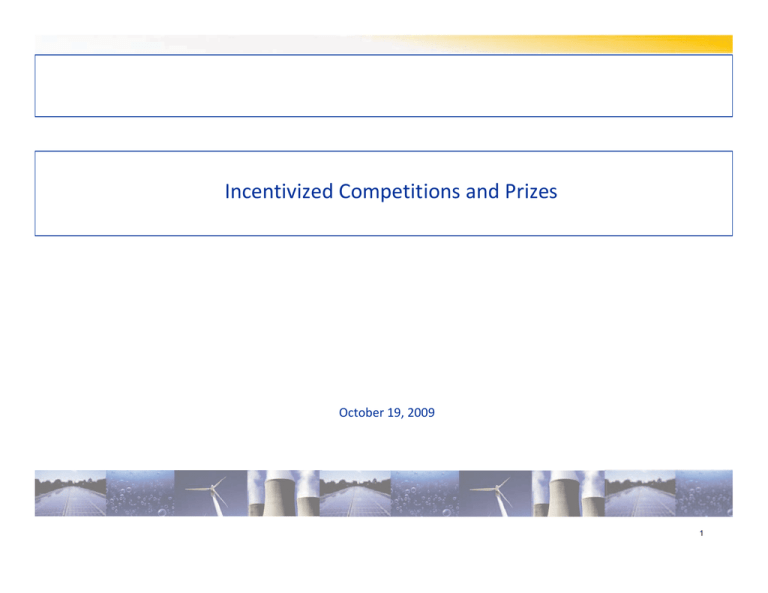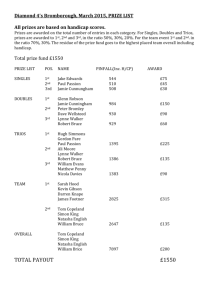Incentivized Competitions and Prizes October 19, 2009 1
advertisement

Incentivized Competitions and Prizes October 19, 2009 1 Strategic Priorities 2 National security, environmental and economic goals form the basis for a robust National Energy Policy but historical data demonstrates the magnitude and urgency of the challenge. Environmental Stewardship 67% Historical 2000 33% Balance of US Trade Deficit after Petroleum Im ports $252 1600 Other 1000 79 $335 $326 400 US Greenhouse Gas Emissions by Source(3) $449 $133 $381 $418 2003 2002 2001 1970 1960 0 1950 Braz il Mexico C hina U SA R us s ia C anada Liby a N igeria Venez uela U AE Kuw ait I raq Proven Oil Reserves (1) $331 $490 $535 $536 $488 $395 Transportation Petroleum 200 2000 16 13 12 Electricity 2030 29 28 600 2020 36 $104 800 2010 42 $120 $104 2000 87 1990 102 98 1200 120 1980 115 $302 $180 1400 138 I ran ($BN) US Petroleum Imports EISA Impact (2) 1800 180 Saudi Arab ia Projected 1Q08A Non-OPEC (MMTC) 2200 2004 OPEC • Create a more flexible, more reliable and higher capacity U.S. energy infrastructure • Improve the energy productivity of the U.S. economy 2007 (Billions of Barrels) 264 • Reduce greenhouse gas emissions and other negative environmental impacts 2006 • Diversify our energy mix and reduce dependence on petroleum Economic Competitiveness 2005 Energy Security US Historical Trade Deficit(4) (1) Source: BP Statistical Review of World Energy, June 2008. Note: Includes 152 BN barrels of Canadian Tar Sands. Higher USA figure includes 86 BN barrels and 4 BN barrels in the Outer Continental Shelf and Arctic National Wildlife Refuge, respectively according to EIA. Only top producing nations shown. (2) Difference between 2007 and 2008 American Energy Outlooks largely attributable to the passage of the Energy Independence and Security Act of 2007 signed by President Bush in December 2007. (3) Source: American Energy Outlook 2008, Energy Information Agency. (4) Source: US Department of Labor, Bureau of Economic Analysis, International Transactions Accounts. Note: 2008 annualized from Q1 data. 3 DOE Historical Budget DOE budget authority (2008$, in billions) 40 35 30 25 20 Environmental Management 15 National Security 10 Science 5 Energy 0 FY 78 FY 80 FY 82 FY 84 FY 86 FY 88 FY 90 FY 92 FY 94 FY 96 FY 98 FY 00 FY 02 FY 04 FY 06 FY 08 Note: FY07 data based on revised request FY08 data based on request 4 DOE Historical Funding for Science & Energy (Constant FY 2008 dollars) 60 50 40 30 20 10 0 '7980 '8182 '8384 '8586 '8788 '8990 '9192 '9394 '9596 '9798 '9900 '0102 '0304 '0506 '0708 '0910 Major increases in Science and Energy in FY 2009 and FY 2010 Note: 2009-10 includes $27 billion in Recovery Act 5 Innovation Pipeline Commercialization Scaling Deployment Delivery Demand Pull Public benefit is only fully realized upon product delivery to market 6 2/24/2010 Energy R&D Pipeline Energy Innovation Pipeline Government-Dominated Funding Industry-Dominated Funding High Risk, High Payoff ARPA-E Office Breakthrough; Opportunistic; Focused of Science Includes Energy Frontier Research Centers Energy Innovation Hubs Big problem; Stable; Longer-term Applied Offices Innovative Program Loans Low Risk, Evolutionary Basic Commercial-ready Program Applied Deployed 7 DOE is uniquely positioned to promote open collaboration and incentivized competitions • Open collaboration – Traditionally DOE highly secure, clearance heavy, secret – Private sector often incentivized to protect trade secrets, patents and IP to the detriment of moving industry forward – Today DOE promotes open collaboration • Incentivized competition – DOE leverages research and investment dollars by supporting and promoting competitions DOE looks to tap into American ingenuity, creativity, and spirit to identify alternatives and create momentum to shift away from oil 8 2/24/2010 Incentivized competition drives innovation • Competition breeds excellence and is disruptive to the status quo • DOE has a track record of using prizes • Prizes Work – Incumbents are best challenged by amplifying results. Our national energy status quo is in need of the type of disruption that only competition and ingenuity can bring. – Spur innovation towards achieving our national goals. – Prizes recognize that the best thinking tends to happen not in Washington or even in a laboratory. 9 2/24/2010 Prizes – Vehicles • Challenge X – 17 teams from North American Universities were challenged to re‐ engineer a GM Equinox to minimize energy consumption, emissions, and GHGs while maintaining or exceeding the vehicle's utility and performance. • EcoCar: The NeXT Challenge – Next generation of Challenge X: 3 year competition with Year One Competition Finals occurring this week in Toronto. – Students design and build advanced vehicles that demonstrate leading‐edge automotive technologies with the goal of minimizing the environmental impact of personal transportation following a real‐ world approach. • Progressive Automotive X PRIZE – International competition to design, build and bring to market 100 MPG vehicles with a $10 million prize • Hydrogen Storage H‐Prize – Demonstrate development of an on‐board material that meets or exceeds defined performance criteria with an $1 Million Prize expected in October 2010 2/24/2010 H‐Prize 10 Prizes – Buildings • Building America: The Builder's Challenge – Builders who join the Builders Challenge will commit to constructing homes that rate 70 or better on the EnergySmart Home Scale – that is 30% better than typical new home and almost 2x as efficient as an existing home! – By constructing 220,000 homes to 70 on the E‐Scale by 2012, participating builders will take the equivalent of 50,000 passenger cars off the road for an entire year and will save homeowners $143 million on their energy bills. • Solar Decathlon – 20 international university teams compete to design, build, and operate the most livable, energy‐efficient completely solar‐ powered house. – The 2007 Solar Decathlon crowned the Technische Universität Darmstadt the overall winner. • L Prize – Challenges industry to develop high‐performance solid‐state lighting products to replace two of today's most widely used and inefficient products: 60W incandescent and halogen light bulbs. L Prize 11 2/24/2010 Solar Decathlon is a global leader incentivized competition • Purpose – The Solar Decathlon brings attention to one of the biggest challenges we face—an ever‐ increasing need for energy. As an internationally recognized event, it offers powerful solutions—using energy more efficiently and using energy from renewable sources. – In 2007, 20 international university teams competed to design, build, and operate the most livable, energy‐efficient completely solar‐powered house. Technische Universität Darmstadt was crowned the overall winner. • 2009 Solar Decathlon Contests – Architecture – Market Viability – Engineering – Lighting Design – Communications – Comfort Zone – Hot Water – Appliances – Home Entertainment – Net Metering 12 2/24/2010 Prizes – Business Plans • California Clean Tech Open – From the past three years, 84% of the Alumni are still viable businesses and have secured more than $125 million in funding, while the prize levels top out at $100,000. • Global Venture Challenge – Hosted by Oak Ridge National Laboratory, students develop unique and innovative product ideas that can solve existing market needs and have the potential to become sustainable businesses. – The event theme for 2009 is Industrial Energy Efficiency and is sponsored by the U.S. Department of Energy’s Industrial Technologies Program. • MIT Clean Energy Entrepreneurship Prize – Stimulates relationships between academic, community, industry, and government organizations to meet the world’s energy challenge through innovation and entrepreneurship. 13 2/24/2010 Future Prizes • Freedom Prize – Focus on strategies to deploy existing technologies and to encourage changes in processes, policies, and behavior to reduce our dependence on oil – Tap into American ingenuity, creativity, and spirit to identify alternatives and create momentum to shift away from oil – The first competition will focus on school bus fleets, with $1.5 million in awards for innovative strategy and technology changes that have a lasting impact. – Schools Fleet Challenge launch target is Fall 2009 14 2/24/2010 Prizes – K‐12 Education • Ad Council • Science Bowl – Students create and produce multi‐media ads about energy efficiency and place on YouTube. 800,000 – HS Students answer questions on topics in astronomy, biology, chemistry, mathematics, and physics in a highly competitive, Jeopardy‐ style format. Middle School students also design, build, and race hydrogen fuel cell model cars. 2,300,000 15 QUESTIONS ? 16 Prizes – K‐12 Education University level (4 competitions; 1 Awareness campaign) • Hydrogen Student Design Contest (160 students)………………$20,000. Students design a real‐world hydrogen application; themes have included hydrogen fueling station, hydrogen power park, hydrogen and fuel cell technologies at airports, and hydrogen and fuel cell technologies on a college campus. • Solar Decathlon (400 students)……………………………..………$ 4,450,000. University students compete by building 800 square foot solar efficient homes. • Eco Car Competition (150 students) …………………………….. $2,000,000 Three‐year competition to reengineer a crossover vehicle provided by GM that reduces fuel consumption and lowers emissions by using advanced vehicle technologies, such as: plug‐in hybrid technology, hybrid technology, diesel technology and other advanced fueling technologies. • Global Venture Challenge …………………………………………$200,000. Student business competition focused on Industrial Energy Efficiency technologies (www.globalventurechallenge.com) • Smart Power Energy Efficiency Campaign (20,000 students)….$200,000. Social media campaign to link America's Greenest Campus and a YouTube Ad Contest through letsgetenergysmart.com, teens and young adults can compete through their universities or through video to save energy and reduce greenhouse gas emissions. K‐12 level: (3 Competitions) • Automotive X PRIZE Competition (new competition)……… $3,500,000. National Education/Outreach about advanced, energy‐efficient vehicles with 3 integrated activities: 1) on‐line knowledge center ‐‐ www.fuelourfuturenow.com, 2) development of a vehicle telemetry package and integration of that package with the AXP online knowledge center, and 3) national content where students design a next‐ generation Dashboard. • Ad Council …………………………………………………………$800,000 Students create and produce multi‐media ads about energy efficiency and place on YouTube. • Science Bowl…………………………………………………………$2,300,000. HS Students answer questions on topics in astronomy, biology, chemistry, mathematics, and physics in a highly competitive, Jeopardy‐style format. Middle School students also design, build, and race hydrogen fuel cell model cars. 17 MIT OpenCourseWare http://ocw.mit.edu ESD.172J / EC.421J X PRIZE Workshop: Grand Challenges in Energy Fall 2009 For information about citing these materials or our Terms of Use, visit: http://ocw.mit.edu/terms.

